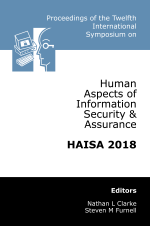In 2014, we launched our open-access repository which offers full text access to conference proceedings from many of our events including the INC and HAISA series. These papers are free to access and distribute (subject to citing the source).
» Openaccess proceedings » Twelfth International Symposium on Human Aspects of Information Security & Assurance (HAISA 2018)
 | Twelfth International Symposium on Human Aspects of Information Security & Assurance (HAISA 2018) |
Title: Self-disclosing on Facebook can be Risky: Examining the Role of Trust and Social Capital
Author(s): Dragana Calic, Mary Brushe, Kathryn Parsons, Christopher Brittain
Reference: pp225-235
Keywords: Self-disclosure; Trust; Social capital; Facebook
Abstract: Social media has become core to our daily interactions, enabled by people’s willingness to share feelings, opinions, and even the most mundane details of their lives. These self-disclosure practices raise many questions about why people disclose in such a public manner, despite the potential risks. The present study examined self-disclosure on Facebook and considered two factors that may encourage people to share more information: trust and social capital. Self-disclosure, trust and social capital have not been previously studied in combination. Trust was considered in terms of an individual’s trust in Facebook, and general trust, as a personality disposition. Two types of social capital, namely, bridging and bonding, were measured. Data collection involved an online survey completed by 263 Australian Facebook users. The results showed that general trust was not related to self-disclosure on Facebook. However, trust in Facebook, as well as bridging and bonding social capital all correlated with self-disclosure on Facebook. Regression analysis revealed that bridging social capital was the only independent variable that significantly predicted self-disclosure on Facebook. This is alarming because bridging social capital could be linked to more security risks, as people are focused on the benefits of broadening their online networks, rather than the potential risks of sharing personal information with a large number of people. Findings from this research offer important insights about why people may be inclined to share information on social media, and could be useful in the communication of social media risks.
Download count: 2124
How to get this paper:


PDF copy of this paper is free to download. You may distribute this copy providing you cite this page as the source.
